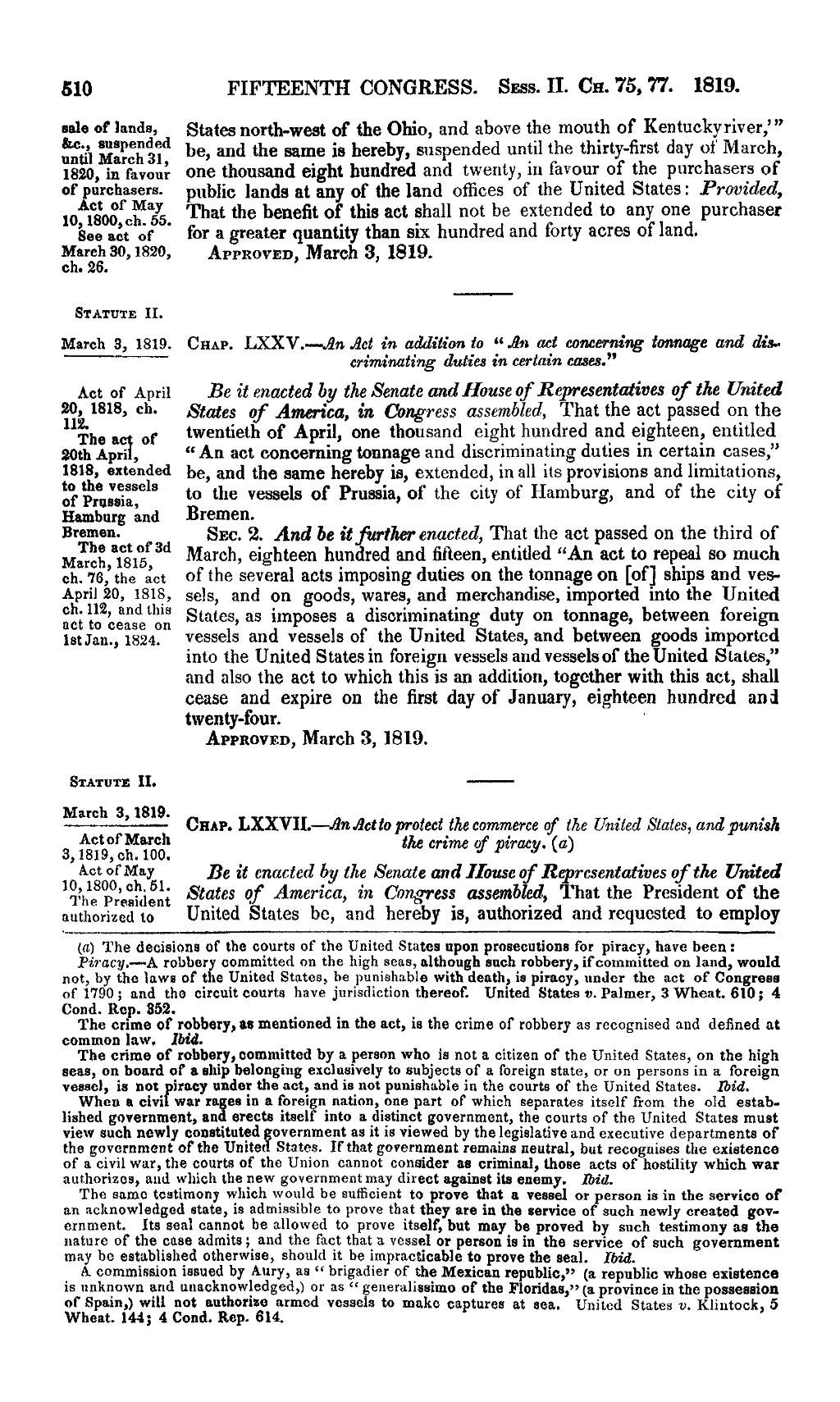be, and the same is hereby, suspended until the thirty-first day of March, one thousand eight hundred and twenty, in favour of the purchasers of public lands at any of the land offices of the United States: Provided, That the benefit of this act shall not be extended to any one purchaser for a greater quantity than six hundred and forty acres of land.
Approved, March 3, 1819.
Statute II.
Chap. LXXV.—An Act in addition to “An act concerning tonnage and discriminating duties in certain cases.”
Act of April 20, 1818, ch. 112.
The act of 20th April, 1818, extended to the vessels of Prussia, Hamburg and Bremen.Be it enacted by the Senate and House of Representatives of the United States of America in Congress assembled, That the act passed on the twentieth of April, one thousand eight hundred and eighteen, entitled “An act concerning tonnage and discriminating duties in certain cases,” be, and the same hereby is, extended, in all its provisions and limitations, to the vessels of Prussia, of the city of Hamburg, and the city of Bremen.
The act of 3d March, 1815, ch. 76, the act of April 20, 1818, ch. 112, and this act to cease on 1st Jan., 1824.Sec. 2. And be it further enacted, That the act passed on the third of March, eighteen hundred and fifteen, entitled “An act to repeal so much of the several acts imposing duties on the tonnage on [of] ships and vessels, and on goods, wares, and merchandise, imported into the United States, as imposes a discriminating duty on tonnage, between foreign vessels and vessels of the United States, and between goods imported into the United States in foreign vessels and vessels of the United States,” and also the act to which this is an addition, together with this act, shall cease and expire on the first day of January, eighteen hundred and twenty-four.
Approved, March 3, 1819.
Statute II.
Chap. LXXVII.—An Act to protect the commerce of the United States, and punish the crime of piracy.[1]
Act of May 10, 1800, ch. 51.
The President authorized to employ the public armed vessels to protect merchant vessels.
Merchant vessels may defend against aggression, &c. by any armed vessel other than a public armed vessel of a nation in amity.
The President authorized to instruct commanders of public armed vessels to take and send into port armed vessels, &c. which have attempted or committed piratical aggression, &c.Be it enacted by the Senate and House of Representatives of the United States of America in Congress assembled, That the President of the United States be, and hereby is, authorized and requested to employ
- ↑ The decisions of the courts of the United States upon prosecutions for piracy, have been: Piracy.—A robbery committed on the high seas, although such robbery, if committed on land, would not, by the laws of the United States, be punishable with death, is piracy, under the act of Congress of 1790; and the circuit courts have jurisdiction thereof. United States v. Palmer, 3 Wheat. 610; 4 Cond. Rep. 352. The crime of robbery, as mentioned in the act, is the crime of robbery as recognised and defined at common law. Ibid. The crime of robbery, committed by a person who is not a citizen of the United States, on the high seas, on board of a ship belonging exclusively to subjects of a foreign state, or on persons in a foreign vessel, is not piracy under the act, and is not punishable in the courts of the United States. Ibid. When a civil war rages in a foreign nation, one part of which separates itself from the old established government, and erects itself into a distinct government, the courts of the United States must view such newly constituted government as it is viewed by the legislative and executive departments of the government of the United States. If that government remains neutral, but recognises the existence of a civil war, the courts of the Union cannot consider as criminal, those acts of hostility which war authorizes, and which the new government may direct against its enemy. Ibid. The same testimony which would be sufficient to prove that a vessel or person is in the service of an acknowledged state, is admissible to prove that they are in the service of such newly created government. Its seal cannot be allowed to prove itself, but may be proved by such testimony as the nature of the case admits; and the fact that a vessel or person is in the service of such government may be established otherwise, should it be impracticable to prove the seal. Ibid. A commission issued by Aury, as “brigadier of the Mexican republic,” (a republic whose existence is unknown and unacknowledged,) or as “generalissimo of the Floridas,” (a province in the possession of Spain,) will not authorize the armed vessels to make captures at sea. United States v. Klintock, 5 Wheat. 144; 4 Cond. Rep. 614.
